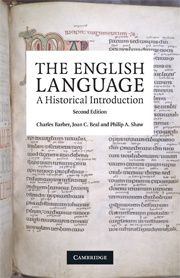Book contents
- Frontmatter
- Contents
- List of figures
- Preface to the second edition
- Preface to the first edition
- Map showing the counties of England
- 1 What is language?
- 2 The flux of language
- 3 The Indo-European languages
- 4 The Germanic languages
- 5 Old English
- 6 Norsemen and Normans
- 7 Middle English
- 8 Early Modern English
- 9 Late Modern English
- 10 English as a world language
- 11 English today and tomorrow
- Notes and suggestions for further reading
- Bibliography
- Index
Preface to the first edition
- Frontmatter
- Contents
- List of figures
- Preface to the second edition
- Preface to the first edition
- Map showing the counties of England
- 1 What is language?
- 2 The flux of language
- 3 The Indo-European languages
- 4 The Germanic languages
- 5 Old English
- 6 Norsemen and Normans
- 7 Middle English
- 8 Early Modern English
- 9 Late Modern English
- 10 English as a world language
- 11 English today and tomorrow
- Notes and suggestions for further reading
- Bibliography
- Index
Summary
Enormous numbers of ordinary people are fascinated by language, and have views about it, often strong. This book aims to provide material which will interest these general readers, and give them things to think about. Its central theme is the history of the English language, beginning with our remote Indo-European ancestors and working its way from Anglo-Saxon times down to the present day. Use is made of numerous short passages of English, to illustrate the varieties of the language in different times and places.
Many other languages are also given some attention. In the course of its history, English has been influenced by numerous languages, especially by Latin, by French and by the Scandinavian languages. In more recent times, colonization and worldwide trade have led to contributions to its vocabulary by the speech of many countries – from Greenland to South Africa, from India to Mexico. Something is therefore said about such languages, but nevertheless the main theme of the book is the English language.
But while there is widespread interest in language, there is also a good deal of prejudice and ignorance about it. Much of the ignorance is due to an absence of technical knowledge about such things as phonology and grammar: it is difficult, for example, to write coherently about pronunciation without some grasp of phonetics. I try to overcome this difficulty by giving a clear and simple introduction to the basic concepts of linguistics, which are not really difficult to grasp.
- Type
- Chapter
- Information
- The English LanguageA Historical Introduction, pp. xi - xiiiPublisher: Cambridge University PressPrint publication year: 2009

